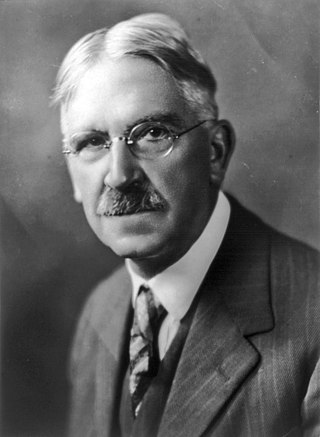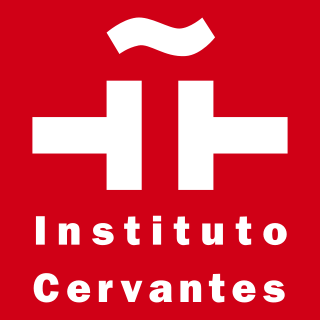
John Dewey was an American philosopher, psychologist, and educational reformer. He was one of the most prominent American scholars in the first half of the twentieth century.

A teacher, also called a schoolteacher or formally an educator, is a person who helps students to acquire knowledge, competence, or virtue, via the practice of teaching.
Sinology, also referred to as China studies, is a subfield of area studies or East Asian studies involved in social sciences and humanities research on China. It is an academic discipline that focuses on the study of the Chinese civilization primarily through Chinese language, history, culture, literature, philosophy, art, music, cinema, and science. Its origin "may be traced to the examination which Chinese scholars made of their own civilization."

Pedagogy, most commonly understood as the approach to teaching, is the theory and practice of learning, and how this process influences, and is influenced by, the social, political, and psychological development of learners. Pedagogy, taken as an academic discipline, is the study of how knowledge and skills are imparted in an educational context, and it considers the interactions that take place during learning. Both the theory and practice of pedagogy vary greatly as they reflect different social, political, and cultural contexts.

The American Political Science Association (APSA) is a professional association of political scientists in the United States. Founded in 1903 in the Tilton Memorial Library of Tulane University in New Orleans, it publishes four academic journals: American Political Science Review, Perspectives on Politics, Journal of Political Science Education, and PS – Political Science & Politics. APSA Organized Sections publish or are associated with 15 additional journals.

Instituto Cervantes is a worldwide nonprofit organization created by the Spanish government in 1991. It is named after Miguel de Cervantes (1547–1616), the author of Don Quixote and perhaps the most important figure in the history of Spanish literature. The Cervantes Institute is the largest organization in the world responsible for promoting the study and the teaching of Spanish language and culture.
This is an index of education articles.
The Association for Asian Studies (AAS) is a scholarly, non-political and non-profit professional association focusing on Asia and the study of Asia. It is based in Ann Arbor, Michigan, United States.
East Asian studies is a distinct multidisciplinary field of scholarly enquiry and education that promotes a broad humanistic understanding of East Asia past and present. The field includes the study of the region's culture, written language, history and political institutions. East Asian studies is located within the broader field of Asian studies and is also interdisciplinary in character, incorporating elements of the social sciences and humanities, among others. The field encourages scholars from diverse disciplines to exchanges ideas on scholarship as it relates to the East Asian experience and the experience of East Asia in the world. In addition, the field encourages scholars to educate others to have a deeper understanding of and appreciation and respect for, all that is East Asia and, therefore, to promote peaceful human integration worldwide.

Composition studies is the professional field of writing, research, and instruction, focusing especially on writing at the college level in the United States.

Oriental studies is the academic field that studies Near Eastern and Far Eastern societies and cultures, languages, peoples, history and archaeology. In recent years, the subject has often been turned into the newer terms of Middle Eastern studies and Asian studies. Traditional Oriental studies in Europe is today generally focused on the discipline of Islamic studies; the study of China, especially traditional China, is often called Sinology. The study of East Asia in general, especially in the United States, is often called East Asian studies.

George Babcock Cressey was an American geographer, author, and academic. Born in Tiffin, Ohio, he attended Denison University and then the University of Chicago, where he received a PhD in geology. After receiving his degree, he taught at University of Shanghai and traveled widely in China. Upon his return to the United States in 1929, he completed a pioneering book on the country, China's Geographic Foundations.

Dorothy Ko is a Professor of History and Women's Studies at the Barnard College of Columbia University. She is a historian of early modern China, known for her multi-disciplinary and multi-dimensional research. As a historian of early modern China, she has endeavored to engage with the field of modern China studies; as a China scholar, she has always positioned herself within the study of women and gender and applied feminist approaches in her work; as a historian, she has ventured across disciplinary boundaries, into fields that include literature, visual and material culture, science and technology, as well as studies of fashion, the body and sexuality.

Open educational practices (OEP) are part of the broader open education landscape, including the openness movement in general. It is a term with multiple layers and dimensions and is often used interchangeably with open pedagogy or open practices. OEP represent teaching and learning techniques that draw upon open and participatory technologies and high-quality open educational resources (OER) in order to facilitate collaborative and flexible learning. Because OEP emerged from the study of OER, there is a strong connection between the two concepts. OEP, for example, often, but not always, involve the application of OER to the teaching and learning process. Open educational practices aim to take the focus beyond building further access to OER and consider how in practice, such resources support education and promote quality and innovation in teaching and learning. The focus in OEP is on reproduction/understanding, connecting information, application, competence, and responsibility rather than the availability of good resources. OEP is a broad concept which can be characterised by a range of collaborative pedagogical practices that include the use, reuse, and creation of OER and that often employ social and participatory technologies for interaction, peer-learning, knowledge creation and sharing, empowerment of learners, and open sharing of teaching practices.
Jean Fox O'Barr is an American feminist teacher, scholar, and administrator whose pioneering work helped establish women’s studies as a program of academic study and support for women in higher education.
Lloyd Irving Rudolph was an American political economist, political scientist, author, political thinker, educationist and the Professor Emeritus of Political Science at the University of Chicago, known for his scholarship and writings on the India social and political milieu. The Government of India, in 2014, honored Lloyd Rudolph and his wife, Susanne Hoeber Rudolph, for their services to literature and education, by bestowing on them the third highest civilian award, the Padma Bhushan.

Ramanujan College is a constituent college of University of Delhi's South Campus. It is named after the Indian mathematician Srinivasa Ramanujan. It is located in Kalkaji, near Nehru Place in South Delhi. The college runs fifteen courses in the disciplines of Humanities, Commerce, Management, Mathematical Sciences, Computer Science and Vocational Studies. It is also the study center for the students of the Non- Collegiate Women's Education Board, University of Delhi and the Indira Gandhi National Open University. Ramanujan College has been accredited grade "A++" by the National Assessment and Accreditation Council (NAAC). Ramanujan College has also been selected by the MHRD as a Teaching Learning Center and National Resource Center.
The University of California, Los Angeles Asian American Studies Center (AASC) is an organization that educates students and the general public about the history of Asian American and Pacific Islanders and their experiences. The AASC is one of the leading and groundbreaking organizations to have substantial and credible resources for their research. Located in Campbell Hall, the AASC quickly became a center for resource-gathering and scholarship for the Asian American movement. Asian American student organizations at CSULA, Occidental, USC, and other colleges soon followed. It was a vital hub and training ground for young activists, a place where they could earn a salary while doing community work.
East Asian History is a biannual peer-reviewed open-access academic journal published by the Australian National University. It was established in 1970 as Papers on Far Eastern History, obtaining its current title in 1991. Published by ANU's Research School of Pacific and Asian Studies, it was part of a growth in publication on Asian studies in Australia in the 1970s. Originally "founded as a forum for the publication of papers written by the faculty and students of Australian National University" affiliates of ANU continued to "represent the large majority of its contributors, although over the years there have been increasing contributions from scholars from other universities in Australia and abroad." Chinese History: A Manual included the journal as one of the main Western-language journals for research on Chinese history.

Tibet: The Road Ahead is a nonfiction book by Dawa Norbu, a Professor of Tibetan Studies at Jawaharlal Nehru University.












